Working as a wellness coach can be one of the most rewarding careers. You get paid for helping people transform what might be the most important aspect of life.
Well-being is the foundation for everything else, including harmonious relationships and a thriving career or business.
If the idea of wellness coaching sparked something within you, your next step is to learn how to become a wellness coach. In this article, we’ll explore:
- Wellness coach certifications
- What a wellness coach is
- Life coaches vs. wellness coaches
- How to become a wellness coach
What is A Wellness Coach?
Wellness coaches help their clients feel better and achieve their health goals. They often have a broader scope of work than health coaches, although some use the terms interchangeably.
One way of distinguishing them is that wellness coaches focus more on the “softer” factors behind peak health. For example:
- Spirituality
- Stress management
- Mindfulness
In contrast, health coaches may work on holistic healing of physical disease, nutrition, or weight management. That being said, wellness coaching falls under the umbrella of health coaching.
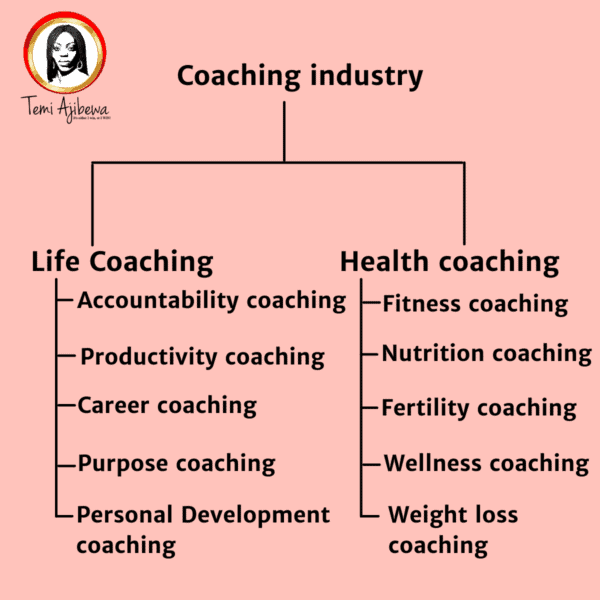
A wellness coach can also help clients with:
- Developing a positive mindset
- Improving self-esteem
- Gaining work-life balance
Thus, becoming a wellness coach can be a great option if you want to work with people who aren’t necessarily ill or need to change their diet but want to improve their mental or emotional well-being.
Pro tip: Wish it were simpler to start and manage your own wellness coaching business? Try Paperbell for free to launch an all-in-one coaching site with bookings, payments, communications, and more built right in.
Life Coaches vs. Wellness Coaches
To define what a wellness coach does, we compared the definition to that of a health coach. But what is the difference between a life coach and a wellness coach?
A life coach has an even broader scope. They help clients with:
- Relationships
- Health
- Wellness
- Careers
- Fitness
- Mindset
- Time management
- Business, and more
Life coaches care about balancing all areas of their clients’ lives.
Ultimately, your niche choice comes down to where you want to place yourself on the scale, from general to specific:
- Do you prefer the novelty of solving different problems for each client?
- Does the thought of focusing on one or a few well-defined issues and becoming an expert on them excite you?
The answer can give hints on whether you want to become a life or wellness coach.
And remember – you can always change your title later! Perhaps you’ve been working with a client and discovered you were passionate about helping them solve that problem.
Some examples of titles to explore are happiness coach and mental health coach.
How to Become a Wellness Coach
In contrast to other professions, you don’t need a certification to start working with clients as a wellness coach. You might still want to pursue a wellness coach certification for different reasons, such as:
- Confidence in your coaching skills
- A wider knowledge of health and wellness
- Credibility
We’ll cover some specific wellness coach certifications to consider later in this article.
On top of that, certification in CPR, stress management, nutrition, or mindfulness can complement your wellness coaching skills.
But apart from that, how do you actually go out and start coaching? Follow these steps and you’ll have your own wellness coaching practice in no time.
1. Identify your wellness coaching focus.
The most critical factor in becoming a successful wellness coach is being able to help your clients achieve results. A recommendation within the coaching space is to coach something you have personal experience with and have overcome.
This is why finding your niche as a coach is one of the best ways to build a successful coaching business.
For example, you may have experienced burnout, which led you to change your priorities and lead a more stress-free lifestyle. Or, you may have struggled with anxiety or a negative mindset and found a way to recover and thrive.
Look back at your health issues and wins, and you’ll find a great place to start.
Specifically, consider these questions to clarify your focus:
- What wellness challenges have you personally overcome?
- Which aspects of wellness are you most passionate about (stress management, mindfulness, work-life balance, spiritual wellness, etc.)?
- What types of clients do you want to work with (busy professionals, new parents, entrepreneurs, retirees)?
Your personal experience, combined with a genuine passion for helping others, creates authentic coaching that resonates with clients.
2. Set up your coaching business with Paperbell.
Once you’re ready to work with clients, you need systems to manage your wellness coaching practice efficiently. Paperbell provides everything you need to run your business from a single platform designed specifically for coaches.
- Build your wellness coaching packages. Design packages that reflect your coaching style. You can create individual sessions, group programs, digital resources, or a combination. Specify what’s included, session formats, and the transformation clients will experience. You can structure different appointment lengths based on what each package requires.
- Configure payment options. Give clients flexibility with one-time payments, installment plans, or ongoing subscriptions. For payment plans, you have the option to collect an upfront deposit.

- Control your schedule. Define when you’re generally available, then adjust availability for specific packages. Maybe you prefer morning slots for one-on-one wellness sessions and afternoon blocks for group workshops.
- Get your coaching website live. Instead of needing separate website tools, Paperbell builds your complete coaching website for you. Customize it with your brand colors, a professional photo, and detailed descriptions of your wellness services. Everything potential clients need to learn about and book your services lives in one place.
- Handle paperwork seamlessly. Add your coaching agreement so clients can review and sign it as part of booking. Design custom questionnaires to understand each client’s wellness journey, current struggles, and aspirations before you meet.
- Support clients between sessions. Provide helpful resources like reflection exercises, wellness assessments, self-care checklists, or meditation guides. Schedule automatic messages for appointment reminders, assignments, or motivation. Your clients get their own secure client portal space to access session notes and materials you share.
Setting this up once means you can welcome as many wellness coaching clients as you want without recreating your systems each time.
3. Start getting your first clients.
With your coaching niche defined and business systems in place, it’s time to attract your first coaching clients:
- Offer free discovery calls. These help potential clients understand how you can help them while allowing you to determine if you’re a good fit. You can set these up easily in Paperbell by setting the price to a single-session package to free.
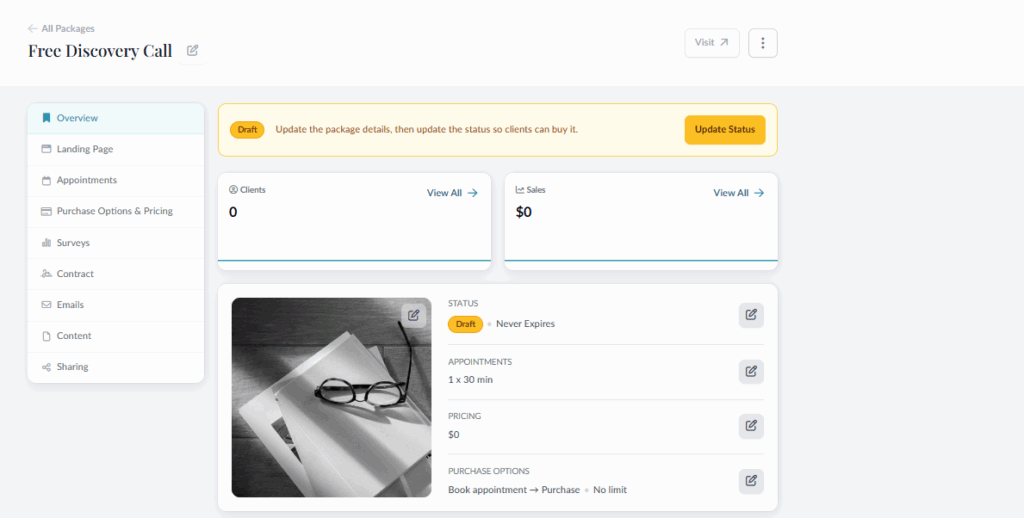
- Leverage your personal network. Let friends, family, and former colleagues know about your wellness coaching services. Ask for referrals or testimonials from anyone you’ve helped informally.
- Build your online presence. Choose one primary marketing channel online and commit to it (SEO, blogging, social media, podcasting, or paid advertising). Focus on growing your audience and driving traffic to your Paperbell website, where potential clients can learn about your services and book discovery calls.
- Nurture leads with email marketing. Not everyone who finds you will be ready to book immediately. Offer a valuable lead magnet (like a wellness assessment, stress management guide, or self-care checklist) to convert your social media followers and/or blog readers into email subscribers. Use a regular coaching newsletter to build relationships, share insights, and stay top-of-mind until subscribers are ready to invest in wellness coaching.
For example, I recently came across a YouTube video from Doc Lyss Fitness about Zone 2 Running. She talks about her free zone calculator, which is available in her video description.

To access the calculator, you need to join Doc Lyss’ email list. And once you’re on the list, she starts sending super relevant information.
For example, this email breaks down running zones in super-simple and easy-to-understand bullet points.
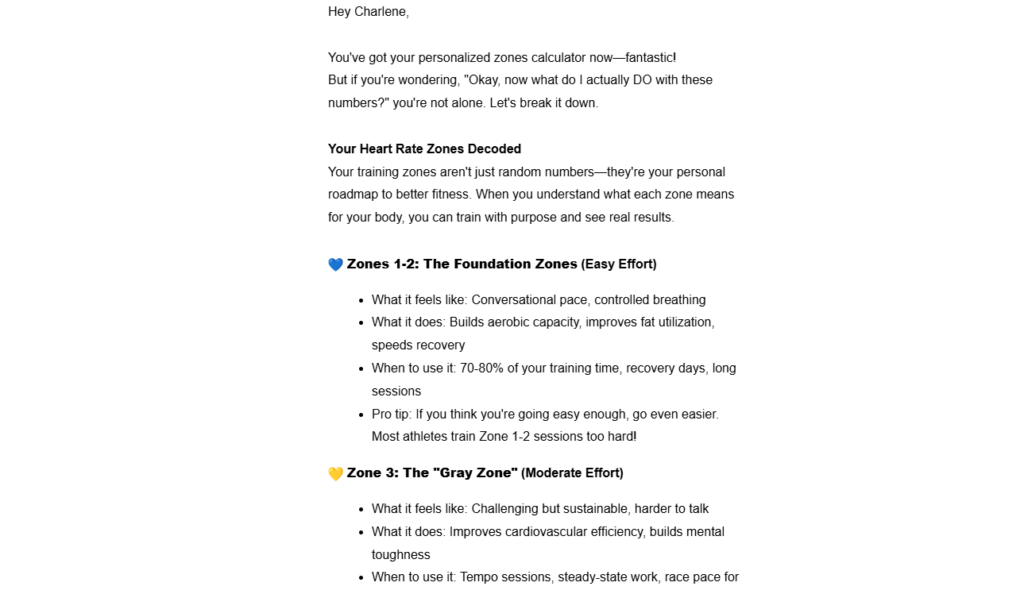
You can start growing your email list right away. However, if you can only manage one thing, start growing your online audience first to get those first couple of clients.
Then, focus on delivering excellent results. If you do that, your business will grow through word-of-mouth and referrals.
Wellness Coach Certifications
You have many options if you pursue a wellness coach certification.
The National Board for Health and Wellness Coaching is an organization that quality-assures health and wellness coaching. Choosing a training program approved by the board is a quality stamp that can help add credibility, especially when you’re new.
A national board-certified health and wellness coach must pass a centralized exam proving their skills.
Here are our recommendations for becoming a certified wellness coach.
Some programs require a bachelor’s degree. Others suit wellness professionals or individuals passionate about lifestyle changes.
Most are board-approved, with some also recognized by the International Coaching Federation (ICF).
1. Mayo Clinic Wellness Coach Training Program

The wellness coaching certification from Mayo Clinic has an excellent reputation. It is 100% online and only 12 weeks long, yet it covers many relevant topics, including how to incorporate self-care into your coaching career.
A drawback is that you need a bachelor’s degree. Although the curriculum is relatively short, you must complete 50 practice hours before getting certified.
Pricing: $4,900
2. Duke University’s Integrative Health Coach Training

Lifestyle changes get easier if our daily habits support them. That’s the philosophy of Duke University’s highly acclaimed health coach certification. This 10-month certification is rooted in the science behind behavior change. It includes experiential practice so that you’re ready to coach upon graduation.
Pricing: $5,500
3. Institute for Integrative Nutrition (IIN)

This program from the Institute of Integrative Nutrition provides holistic health coaching skills. Besides course modules focusing on nutrition, the school teaches you how to guide clients toward their goals in all areas of life, including career, spirituality, and relationships.
IIN uses the concept of primary and secondary foods. Primary foods nourish you outside of what you eat: relationships, workouts, spirituality, career, and education. Their philosophy is that these components are more critical to your overall health and well-being than the food on your plate (secondary foods).
IIN offers a year-long training that can be condensed into six months.
Note: Besides your IIN degree, you must take a three-month course to be eligible for the board exam and become a certified health coach with the National Board for Health and Wellness Coaching.
Pricing: Starts at $3,395 for six months.
4. Health Coach Institute – Dual Life & Health Coach Certificate Program

Can’t decide on your niche? Then, Health Coach Institute’s dual certification program might be for you.
This certification is ICF-approved. The flexible format lets you complete the program in 6 to 12 months, depending on your busy schedule. The founders are successful coaches and online entrepreneurs, and they’re sharing their business-building skills in the curriculum to ensure you’ll be able to coach and make good money doing so.
Pricing: $6,750. Health Coach Institute will pay back your tuition if you don’t get a paying client.
5. International Association of Wellness Professionals – Holistic Wellness Coach Curriculum

If you believe wellness is about more than the food you eat and your exercise routine, this might be the wellness coaching certification for you. The International Association of Wellness Professionals (IAWP) offers holistic wellness coach training that takes a 360-degree perspective on health. This certification covers 12 aspects of human health and wellness and dives into topics such as money, sunshine, and air quality.
It is an excellent alternative if you want a truly holistic approach to health. That said, if you prefer to focus on the health side of the wellness spectrum, one of the other options may suit you better.
Pricing: $1,995, or 3 payments of $745.
6. Emory University’s Health and Wellness Coaching Certificate
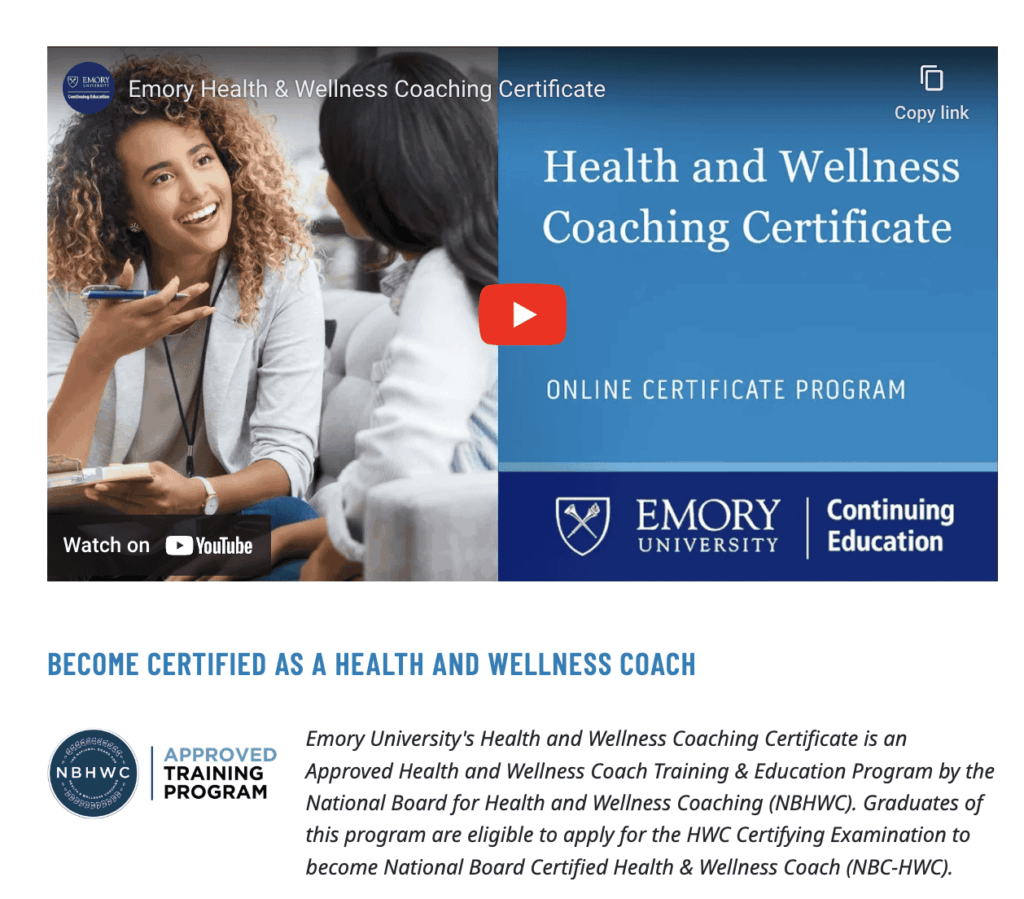
Emory University’s Health and Wellness Coaching Certificate is a 20-week academic immersion. You’ll get an academic certification with an excellent reputation. The program offers a mix of theory and hands-on practice.
You need a bachelor’s degree and 100% attendance in the practice sessions to get certified. So, if you’re on a tight schedule, you may want to look at one of the other trainings that offer more flexibility.
Pricing: $4,995
7. Institute for Wellness Education – Wellness Coach Training Certification
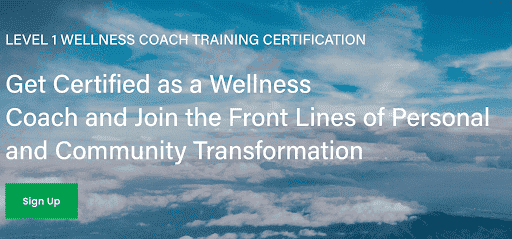
Becoming a certified wellness coach with the Institute for Wellness Education will teach you to coach well. The course is online and self-paced, making it a great option if you have a lot on your plate. It looks outside the individual and covers social, environmental, and spiritual wellness.
However, it is shorter (36-50 hours) and doesn’t include mentorship by an accredited coach, as some other trainings do. Pricing: $895

Your Future As A Thriving Wellness Coach
Working as a wellness coach is incredibly rewarding. You help people transform their well-being, which supports harmonious relationships and successful careers.
If wellness coaching excites you, the next step is to launch your wellness coaching website and start getting clients using Paperbell. Get your free account to try it out and get your site live in minutes.
FAQs About How To Become a Wellness Coach
What skills do you need to be a wellness coach?
The most critical skill to be a wellness coach is helping clients achieve results. It’s recommended to coach something you have personal experience with and have overcome, such as burnout, anxiety, or a negative mindset.
How to create a wellness coaching package?
You can use Paperbell to create wellness coaching packages in a few clicks for 1:1, group, or hybrid coaching. Display your brand new coaching packages on a branded website with payments, contracts, automations, and client management fully built in.
How much do wellness coaches charge?
Wellness coaches typically charge between $75-$200 per hour for individual sessions and or $500-$3,000+ for multi-session packages. Rates vary based on experience, certifications, specialization, and location.

Editor’s Note: This post was originally published in June 2024 and has since been updated for accuracy.









